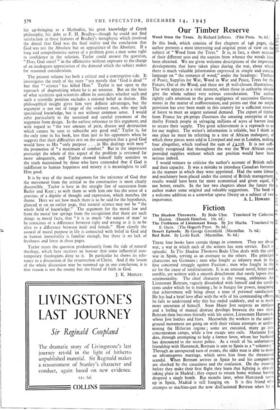Reason and Belief
Does God Exist ? By A. E. Taylor. (Macmillan 7s. 6d.)
°has a few days separated the publication of the book I have reviewed and the death of its author. There could hardly be a better memorial or one more characteristic in brief compass of this learned and acute philosopher. Dr. Taylor was essentially a teacher, and the teacher's art consists largely in making the student ask or face the right questions. Those who learn to do so from this, his last legacy, will not doubt the good fortune of the men and women who listened to him during the years of that distinguished career which culminated in the chair of moral philosophy in the University of Edinburgh.
Taylor was a convinced theist and Christian ; much store of thought and experience had helped to the consolidation of that condition, his up-bringing as a Methodist, his great knowledge of Greek philosophy, his debt to F. H. Bradley—though he could not find satisfaction in those features of Bradley's metaphysic which involved the denial that God was the final reality and the conclusion that God was not the Absolute but an appearance of the Absolute. If a long and comprehensive survey of a problem gives a man some right to confidence in the solution, Taylor could answer the question, " Does God exist? " in the affirmative without exposure to the charge of an inadequate appreciation of the demand which the subject makes for reasoned consideration.
The present volume has both a critical and a constructive side. It investigates the truth of the story " not merely that ' God is dead ' " but that " science' has killed Him." Taylor is not open to the reproach of dogmatising where he is an amateur. But on the basis of what scientists qua scientists affirm he considers whether such and such a scientific position excludes a rational belief in theism. His philosophical insight gives him very definite advantages, but the argument is not out of range of the ordinary man, who may lack specialised knowledge, but is not without common sense. I would refer particularly to the sustained and careful treatment of the argument from design. In the earliest reference to this argument, and with regard to " the vast amount of pain, disease and destruction which cannot be seen to subscribe any good end," Taylor is, for the only time in his book, less than just to his opponents when he suggests that their difficulties rest on the assumption that a good God would have as His "only purpose . . . in His dealings with men" the promotion of " a maximum of comfort." But in the impressive postscript the whole of this aspect of the problem is reviewed far more adequately, and Taylor showed himself fully sensitive to the truth maintained by those who have contended that if God is indifferent to human happiness and misery it is meaningless to call Him good.
It is by way of the moral argument for the existence of God that the movement from the critical to the constructive is most clearly discernible. Taylor is here in the straight line of succession from Butler and Kant ; as with them so with him one has the sense of a gravitas, of a dignity of thought and expression, which matches the theme. Here we see how much there is to be said for the hypothesis, glanced at on an earlier page, that natural science may not be " the whole field of knowledge." The argument for the moral law and from the moral law springs from the recognition that there are such things as moral facts, that " it is as much the nature of man' to be conscious of a difference between right and wrong as it is to be alive to a difference between male and female." How closely the avowal of moral purpose in life is connected with belief in God and in human immortality is familiar enough, but there is no lack of freshness and force in these pages.
Taylor treats the question predominantly from the side of natural theology, which here receives an honour that some influential con- temporary theologians deny to it. In particular he shows its rele- vance to a discussion of the resurrection of Christ. And if the lesson of the whole discussion may be summed up in one conclusion, it is that reason is not the enemy but the friend of faith in God.
J. K. MOZLEY.



























 Previous page
Previous page